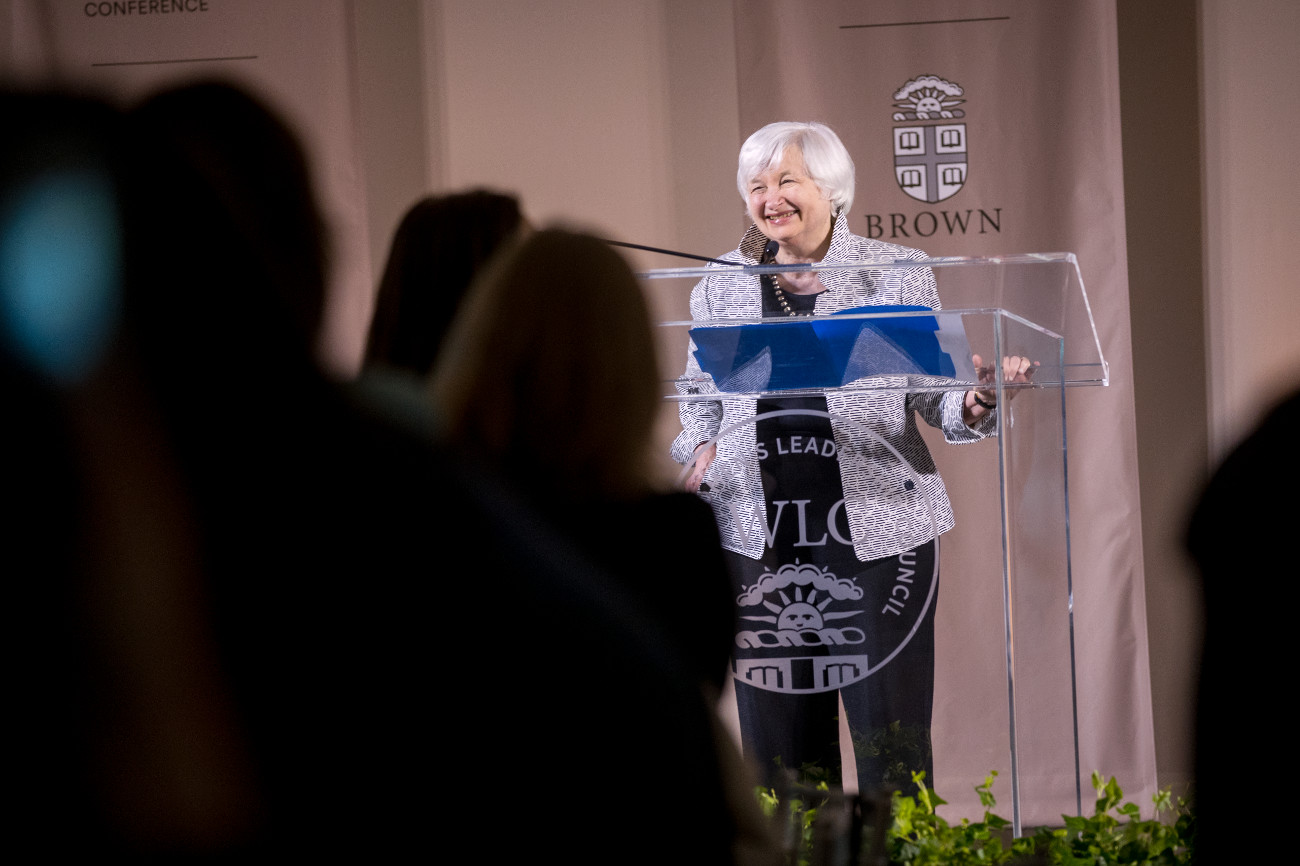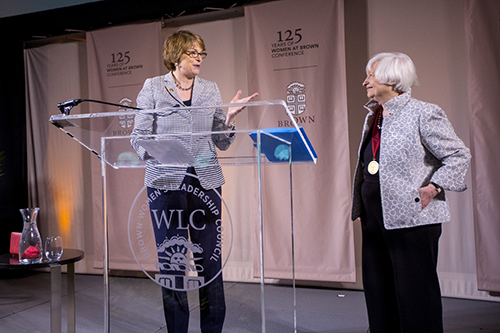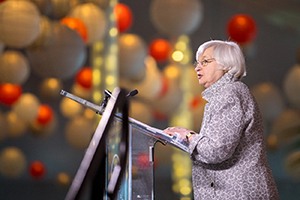
PROVIDENCE, R.I. [Brown University] — As Chair of the Federal Reserve, Janet Yellen has reached the pinnacle of an economics and public service career, but in an address at Brown University, she blended troves of historical data with the stories of fellow Brown alumnae to describe how each generation of women has pushed past barriers, only to find new ones on their way to their career dreams.
“As we celebrate the 125th anniversary of women being admitted to Brown, it seems appropriate to reflect on the progress that women have achieved in the intervening years,” said Yellen, who earned a bachelor’s degree in economics summa cum laude at Brown in 1967. She was a featured speaker in the University’s 125 Years of Women at Brown Conference May 5-6.
The prosperity of American women has long been tied to the prosperity of America, Yellen said. Their advance in the economy, she said, has accelerated overall growth, improved conditions for all workers, and since 1979 accounted for the majority of the rise in real household income.
“Despite this progress, evidence suggests that many women remain unable to achieve their goals,” she said. “If these obstacles persist, we will squander the potential of many of our citizens and incur a substantial loss to the productive capacity of our economy at a time when the aging of the population and weak productivity growth are already weighing on economic growth.”
A history told through Brown
In her speech, Yellen traced the history of women’s often hard-fought increase in economic participation through the voices of participants in the Brown Women Speak oral history archive. As assembled by Yellen, they told the story of aspirations curtailed by cultural limitations that took decades to fall away.
A century ago only a slim majority of women were enrolled in school and only 2 percent attained any higher education. Uneducated women, if they worked, largely toiled as piece workers in factories or as domestics. But even educated women faced severe constraints.
Yellen gave the example of Edna McDonald, graduate of the class of 1919: “Let’s be frank,” Yellen quotes her as saying. “What choices did women have? Teaching. You could teach. You could be a lab technician. Or you could go into office work and be a secretary. Those were the only real choices.”
Another early graduate of Brown’s Women’s College, later called Pembroke, was Margery Chittenden Leonard. She could only find work as a secretary even after earning a law degree at Boston University, where she endured harsh discrimination after refusing to drop out.
Among the stories Yellen told was the struggle of her own husband George’s aunt, Elizabeth Stafford Hirschfelder, who earned bachelor’s and master’s degrees in mathematics at Brown in the 1920s and later a Ph.D. at the University of Wisconsin. Consistent with the times, while Hirschfelder remained an ad hoc instructor at Wisconsin after graduation, the fellow doctoral student that she married progressed to the rank of professor even though they published several papers together and co-authored an esteemed reference work. Hirschfelder only attained the title of assistant professor when the couple divorced, and that rank was the highest she was awarded even after a career of research.
“Although Betty’s accomplishments were considerable, against the backdrop of increasing opportunity for women over her lifetime I believe that Betty Stafford Hirschfelder was denied opportunities and greater success simply because she was a woman,” Yellen said.
As part of a next generation, Yellen herself was able to benefit from those increasing opportunities, brought about by sweeping cultural shifts after World War II. By 1970, the idea that married women needn’t and shouldn’t work had eroded. Only about 5 percent of married women in the 1920s participated in the workforce, but by 1970 the proportion had risen to 40 percent, Yellen said.
“Among those women fortunate to attend Pembroke in this era of dramatic change was me,” she said. “I enrolled at Brown fully planning to attend graduate school and have a career, as did many of my classmates in the class of 1967.”
Yellen went on to earn a Ph.D. at Yale in 1971 and then to professorships at Harvard and Berkeley before joining the Federal Reserve. She became chair of the Board of Governors of the Federal Reserve System and the Federal Open Market Committee in 2014.
In introducing Yellen, Brown University President Christina Paxson noted that the nation’s top economist had originally intended to study philosophy but took the encouragement of her professors to study economics.
“She really epitomizes what many Brown students do,” Paxson said. “They come in thinking they are going to do one thing and then they do something else.”
Moving more barriers aside
In succeeding decades, Yellen said, women have continued to win further freedom to pursue a broader array of careers and to choose their own destinies. But Yellen said crucial barriers still remain, particularly in the area of work-life balance, and offered thoughts on how policy could change to help both women and men better harmonize work and family. Women’s participation in the workforce, she said, peaked in the 1990s at about 75 percent (well below the 88 percent rate for similarly aged men). Women working full time still earn about 17 percent less than men.
Some of the biggest gaps, she said, are at the top of professions such as law or finance where long hours and little time off are considered essential to success. In academia, too, women must make their case for tenure at about the same time they are often contemplating starting a family.
“The difficulty of balancing work and family is a widespread problem,” she said. “In fact, the recent trend in many occupations is to demand complete scheduling flexibility, which can result in too few hours of work for those with family demands and can make it difficult to schedule childcare.
“Reforms that encourage companies to provide some predictability in schedules, cross-train workers to perform different tasks, or require a minimum guaranteed number of hours in exchange for flexibility could improve the lives of workers holding such jobs.”
Yellen also said workers would benefit from a wider availability of affordable childcare and paid family leave, not just for maternity for a broader variety of health and caregiving responsibilities.
Brown’s top presidential honor

After the speech, Paxson returned to the stage to bestow upon Yellen the highest award a Brown president can give, The President’s Medal.
Paxson commended Yellen, “for your wise advancement and application of knowledge of markets, policymaking, and economic behavior to the public good and for the way you have in your life and work reflected the shared values of Brown University, the collaboration we encourage, the intellectual curiosity we foster and the impact we aspire to through our service.”
Though the award is not often given — only 16 times since 1994 before this weekend — as part of the conference celebration, Paxson also honored Susan Pilch Friedman with the medal May 4.
Friedman is a founding member and Chair Emeritus of the Women’s Leadership Council. Calling Friedman “a woman of exceptional vision, leadership, and commitment” she cited Friedman’s support for the Women’s Launch Pad mentoring program for undergraduates and for establishing the Friedman Study Center, the Friedman Auditorium, and, now, Friedman Hall.
